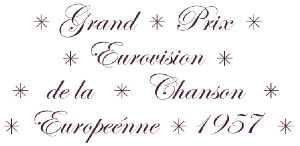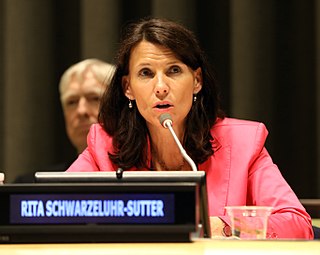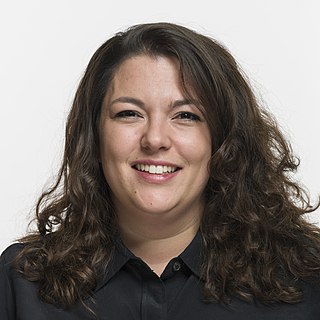
The Eurovision Song Contest 1956 was the first edition of the annual Eurovision Song Contest,organised by the European Broadcasting Union (EBU) and host broadcaster Radio svizzera italiana (RSI) on behalf of the Swiss Broadcasting Corporation. The contest,originally titled the Gran Premio Eurovisione 1956 della Canzone Europea,was held on Thursday 24 May 1956 at the Teatro Kursaal in Lugano,Switzerland,and hosted by Swiss television presenter Lohengrin Filipello,which remains the only time that the contest has been hosted by a solo male presenter.

The Eurovision Song Contest 1957 was the second edition of the annual Eurovision Song Contest. Organised by the European Broadcasting Union (EBU) and host broadcaster Hessischer Rundfunk (HR) on behalf of ARD,the contest,originally known as the Grand Prix Eurovision de la Chanson Européenne 1957 was held on Sunday 3 March 1957 and was hosted at the Großer Sendesaal des hessischen Rundfunks in Frankfurt,West Germany by German actress Anaid Iplicjian.

The Eurovision Song Contest 1968 was the 13th edition of the annual Eurovision Song Contest. It took place in London,United Kingdom,following the country's first victory at the 1967 contest with the song "Puppet on a String" by Sandie Shaw. Despite having won for the first time the year before,it was actually the third time that the United Kingdom had hosted the competition,having previously done so in 1960 and 1963,both of which also took place in London. Organised by the European Broadcasting Union (EBU) and host broadcaster British Broadcasting Corporation (BBC),the contest was held at Royal Albert Hall on 6 April 1968,and was hosted by Katie Boyle for the third time. It was notably also the first time that the contest was broadcast in colour.
Germany debuted in the Eurovision Song Contest 1956,held on 24 May 1956 at the Teatro Cursaal in Lugano,Switzerland. Nord- und Westdeutscher Rundfunkverband (NWRV),on behalf of ARD,organised a national final held on 1 May 1956 to determine two German entries for the contest. The results were determined by a jury panel. The songs "Das Lied vom großen Glück" by Walter Andreas Schwarz,later known as "Im Wartesaal zum großen Glück",and "So geht das jede Nacht" by Freddy Quinn were selected to represent the nation. German entries performed fourth and eleventh,respectively,out of the 14 entries competing in the contest.
Germany held a national final to select the song that would represent Germany at the Eurovision Song Contest 1957. The winner was Margot Hielscher with the song "Telefon,Telefon".

The Swiss Broadcasting Corporation is the Swiss public broadcasting association,founded in 1931,the holding company of 24 radio and television channels. Headquartered in Bern,the Swiss Broadcasting Corporation is a non-profit organisation,funded mainly through radio and television licence fees (79%) and making the remaining income from advertising and sponsorship.
Switzerland participated at the Eurovision Song Contest 2006 with the song "If We All Give a Little" written by Ralph Siegel and Bernd Meinunger. The song was performed by the group six4one,which was internally selected by the Swiss broadcaster SRG SSR idée suisse in November 2005 to represent the nation at the 2006 contest in Athens,Greece. "If We All Give a Little" was presented to the public as the Swiss song on 18 March 2006.
Switzerland competed in the Eurovision Song Contest 2008 with the song "Era stupendo" by Paolo Meneguzzi. Meneguzzi was chosen by the Swiss national broadcaster,SRG SSR idée suisse,to sing for Switzerland in Belgrade,Serbia. For 2008,SRG SSR idée suisse had continued to internally select the song and singer to represent Switzerland at the 2008 contest,with an open call for songs being held by the broadcaster.
Switzerland participated in the Eurovision Song Contest 2011 with the song "In Love for a While" written by David Klein. The song was performed by Anna Rossinelli. The Swiss entry for the 2011 contest in Düsseldorf,Germany was selected through the national final Die grosse Entscheidungs Show 2011,organised by the Swiss German speaking broadcaster Schweizer Fernsehen (SF) and radio station DRS 3 in collaboration with the other broadcasters part of SRG SSR idée suisse. SF,DRS 3,the Swiss-French broadcaster Télévision Suisse Romande (TSR) and the Swiss-Italian broadcaster Radiotelevisione svizzera (RSI) each conducted varying selections and a total of twelve entries were selected to advance to the televised national final—seven artists and songs from the SF selection,three from the DRS 3 selection,one from the TSR selection and one from the RSI selection. The twelve finalists performed during the national final on 11 December 2010 were public voting ultimately selected "In Love for a While" performed by Anna Rossinelli as the winner.
Switzerland participated in the Eurovision Song Contest 2012 with the song "Unbreakable" written by Gabriel Broggini and Ivan Broggini. The song was performed by the duo Sinplus. The Swiss entry for the 2012 contest in Baku,Azerbaijan was selected through the national final Die grosse Entscheidungs Show 2012,organised by the Swiss German speaking broadcaster Schweizer Fernsehen (SF) and radio station DRS 3 in collaboration with the other broadcasters part of the Swiss Broadcasting Corporation. SF,DRS 3,the Swiss-French broadcaster Radio Télévision Suisse (RTS) and the Swiss-Italian broadcaster Radiotelevisione svizzera (RSI) each conducted varying selections and a total of fourteen entries were selected to advance to the televised national final—six artists and songs from the SF selection,three from the DRS 3 selection,three from the RTS selection and two from the RSI selection. The fourteen finalists performed during the national final on 10 December 2011 where public voting ultimately selected "Unbreakable" performed by Sinplus as the winner.
Switzerland participated in the Eurovision Song Contest 2014 with the song "Hunter of Stars" written and performed by Sebalter,which is the artistic name of singer Sebastiano Paù-Lessi. The Swiss entry for the 2014 contest in Copenhagen,Denmark was selected through the national final Die grosse Entscheidungs Show 2014,organised by the Swiss German speaking broadcaster Schweizer Radio und Fernsehen (SRF) in collaboration with the other broadcasters part of the Swiss Broadcasting Corporation. Artists that were interested in entering the Swiss national final had the opportunity to apply to one of three open selections with defined submission periods organised by SRF together with the Swiss-Romansh broadcaster Radiotelevisiun Svizra Rumantscha (RTR),the Swiss-French broadcaster Radio Télévision Suisse (RTS) and/or the Swiss-Italian broadcaster Radiotelevisione svizzera (RSI). A total of 18 entries were selected to advance to an "Expert Check" round;nine entries were selected from the SRF/RTR selection,six entries were selected from the RTS selection and three entries were selected from the RSI selection. The "Expert Check" was held on 30 November 2013 and involved three/four experts evaluating the live performances of the 18 entries and selecting six entries to advance to the televised national final—three artists and songs from the SRF/RTR candidates,two from the RTS candidates and one from the RSI candidates. The six finalists performed during the national final on 1 February 2014 where a combination of jury voting and public voting ultimately selected "Hunter of Stars" performed by Sebalter as the winner.
Switzerland participated in the Eurovision Song Contest 2015 with the song "Time to Shine" written and performed by Mélanie René. The Swiss entry for the 2015 contest in Vienna,Austria was selected through the national final ESC 2015 –die Entscheidungsshow,organised by the Swiss German speaking broadcaster Schweizer Radio und Fernsehen (SRF) in collaboration with the other broadcasters part of the Swiss Broadcasting Corporation. Artists that were interested in entering the Swiss national final had the opportunity to apply to one of three open selections with defined submission periods organised by SRF together with the Swiss-Romansh broadcaster Radiotelevisiun Svizra Rumantscha (RTR),the Swiss-French broadcaster Radio Télévision Suisse (RTS) and/or the Swiss-Italian broadcaster Radiotelevisione svizzera (RSI). A total of 18 entries were selected to advance to an "Expert Check" round;nine entries were selected from the SRF/RTR selection,six entries were selected from the RTS selection and three entries were selected from the RSI selection. The "Expert Check" was held on 7 December 2014 at SRF Studio 5 in Zürich and involved five experts evaluating the live performances of the 18 entries and selecting six entries to advance to the televised national final—three artists and songs from the SRF/RTR candidates,two from the RTS candidates and one from the RSI candidates. The six finalists performed during the national final on 31 January 2015 where a combination of jury voting and public voting ultimately selected "Time to Shine" performed by Mélanie Renéas the winner.

Rita Schwarzelühr-Sutter is a German politician of the Social Democratic Party (SPD) who serves as a member of the German Bundestag,the German federal parliament.

Regula Rytz is a Swiss historian and politician of the Green Party of Switzerland. She was a member of the National Council from 2011 to 2022. From 2012 to 2016,she was the co-president of the Green Party of Switzerland. She was the party president from 2016 to 2020.

Russia participated in the Eurovision Song Contest,a pan-European music competition,from 1994 to 2021,while Ukraine has participated since 2003. Russia and Ukraine had positive relations for several years,and have exchanged top-3 points with each other several times over the years. Barring a minor dispute over Ukraine's 2007 entry "Dancing Lasha Tumbai",notable conflicts began to emerge between the two countries at Eurovision in the wake of Russia's annexation of Crimea from Ukraine in 2014.
Jasmin Staiblin is a German manager. She was the CEO of the Swiss energy group Alpiq 2013-2018. She was also the CEO of ABB Switzerland from 2006 to 2012.

Tamara Funiciello is a Swiss politician who currently serves as member of the National Council (Switzerland) since 2019 for the Social Democratic Party.

Élisabeth Baume-Schneider is a Swiss politician of the Social Democratic Party of Switzerland (SP) and a current member of the Federal Council. She was elected on 7 December 2022,the first ever elected member from the Canton of Jura.

Federal elections were held in Switzerland on 22 October 2023 to elect all members of the National Council and Council of States. The elections were followed by elections to the Federal Council,Switzerland's government and collegial presidency,on 13 December.
Switzerland participated in the Eurovision Song Contest 2022 in Turin,Italy,with "Boys Do Cry" written by Marius Hügli and Martin Gallop. The song was performed by Marius Bear,which is the artistic name of singer Marius Hügli who was internally selected by the Swiss broadcaster Swiss Broadcasting Corporation to represent the nation at the 2022 contest. "Boys Do Cry" was presented to the public as the Swiss entry on 8 March 2022.










